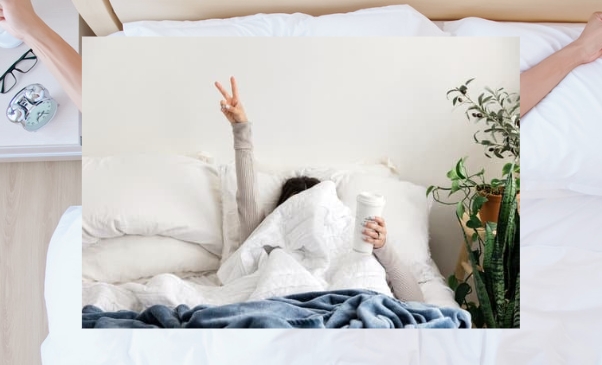
Do you often wake up feeling tired and sleepy, even on days when you got the right amount of sleep? It’s a challenging situation, but the fact that you’re not getting enough good sleep might help you figure out what’s going on. How well you sleep may affect your chance of getting Alzheimer’s disease and your ability to concentrate and stay happy.It will be apparent to you right away that you haven’t been getting enough sleep. It’s harder to figure out why that sleep isn’t restful, but it’s not impossible. Read on to find out the signs and symptoms of not getting enough sleep, what could be causing your poor sleep quality, and what you could do to fix the problem.

Reasons for Poor Sleep Quality:There could be more than one reason why you don’t sleep well. Sleep apnea, stress, and having another long-term health problem or trouble sleeping could all be to blame.Wrong Ways to go to sleepYour ability to fall and stay asleep may be hurt by things like staying up too late or relying too much on coffee or alcohol. A study of nursing students found that smoking and drinking caffeine both make it hard to sleep well. People often think alcohol helps them sleep, but it keeps many from getting a good night’s rest.Stress and AnxietyStress, depression, and anxiety disorders can make it hard to relax and get a good night’s sleep. This is just one way that mental illness can be nasty for a person. But not getting enough sleep and being unable to sleep make these problems much worse.Apnea in SleepA person with sleep apnea will stop breathing sometimes while they are sleeping. Some of these sounds might sound like snoring, choking, or gasping. Sleep quality worsens because the brain makes the body start breathing again, even if the person isn’t awake. People with sleep apnea often have symptoms like being tired and having trouble paying attention.

Disorder of Sleep, Yet UnidentifiedMost people with sleep problems don’t know they have a problem until they go to the doctor for something else, like poor sleep quality or until their bed partner points out the symptoms. Periodic limb movement disorder is often marked by leg jerking during sleep (PLMD). This could make it hard to sleep at night and focus during the day. People with narcolepsy often say they have trouble sleeping and feel tired during the day.How To Improve Your Sleep QualityThe good news is that upgrading to a cleaner bed may be all that’s needed to boost your sleep quality. Maintaining healthy teeth requires daily care with a toothbrush and dental floss. The same holds for developing and maintaining a routine that ensures you get a restful night’s sleep every night. It is recommended that you do both of these actions daily.Try out some of these ideas and see if they work for you:
- At least half an hour before bedtime, disconnect all electronics such as the TV, phone, and computer. The intense blue light emitted by electronic gadgets might trick the brain into believing it is still sunlight. This causes your brain to postpone sleep onset, keeping you awake beyond when it would be healthful.
- Ensuring there is no light, no noise, and the temperature is perfect in your bedroom can make it much simpler to rest and relax there. After turning the heat down to between 60 and 70 degrees Fahrenheit, you may further quiet your mind by utilising a white noise machine or closing the blinds. In addition to bringing the temperature down, this will be useful.
- Maintain a regular sleep-wake schedule by always going to bed and getting up simultaneously. Consistency in routine may help your brain learn to anticipate events like bedtime and morning wake-up time.
- Be careful to schedule your evening so you have time for a whole night’s rest. Adults should get the suggested minimum of seven hours of sleep every night. Developing a nighttime ritual that allows you to wind down is a unique approach to preparing for sleep. Choose an activity like a hot bath, an audiobook, or a journal that you know will help you relax. Your brain is more likely to associate completing these tasks with the onset of sleep if you do them in the same sequence night after night.
- Reduce your intake of both coffee and alcohol. The possibility of these medications being in your system for an extended period raises the risk of trouble falling or staying asleep. No alcoholic beverages or caffeine should be consumed between three to five hours of bedtime.
- Get some fresh air and early morning light by venturing outside first thing in the day. Getting 15–30 minutes of sunlight daily can reset your circadian cycle and increase your alertness.
If you have tried these things and cannot fall asleep, a trip to the doctor is in order. They may recommend further lifestyle adjustments, treatments, or medications in the hopes that you may have improved sleep.The Effects of Sleep DeprivationThe following have been linked to not getting enough sleep:
- Problems and disorders with memory
- Melancholy is a feeling that shows how bad you feel.
- lack of motivation or desire on the part of the person
- Irritability
- A slowing down of how fast people react
- Your risk of getting sick is higher because of the damage to your immune system.
- Feelings of pain that are getting worse and worse
- A higher chance of getting diseases like high blood pressure, diabetes, coronary heart disease, and obesity.
- A deep desire to have sexual contact
- Skin that sags and dark circles under the eyes are signs of ageing.
- overeating and gaining weight because of it
- Having challenging time-solving problems and making good decisions
- Errors in judgement
- Hallucinations
On hand-eye coordination tests and a driving simulator, people awake for a long time did as bad or worse than those given alcohol. This was true no matter how long, or short the participants had been awake.How to Know if You’re Getting Enough Sleep:If you ask yourself the following questions, you’ll be able to tell if you’re getting enough sleep each night:
- Do you think how you sleep now will help you live a healthy and happy life?
- Have you been getting enough sleep to function well during the day?
- Do you find that you can’t keep your eyes open in the middle of the day?
- Do you need coffee every day to be able to function?
- Especially on the weekends, do you usually stick to a routine for when you go to bed and how long you sleep?
Conclusion:If you don’t get enough sleep, your body can’t heal while asleep, which is terrible for your health. A good night’s sleep is good for your physical, mental, and emotional health, safety, and quality of life. A good night’s sleep helps you learn in any situation because it makes it easier to focus, make decisions, and develop new ideas.


